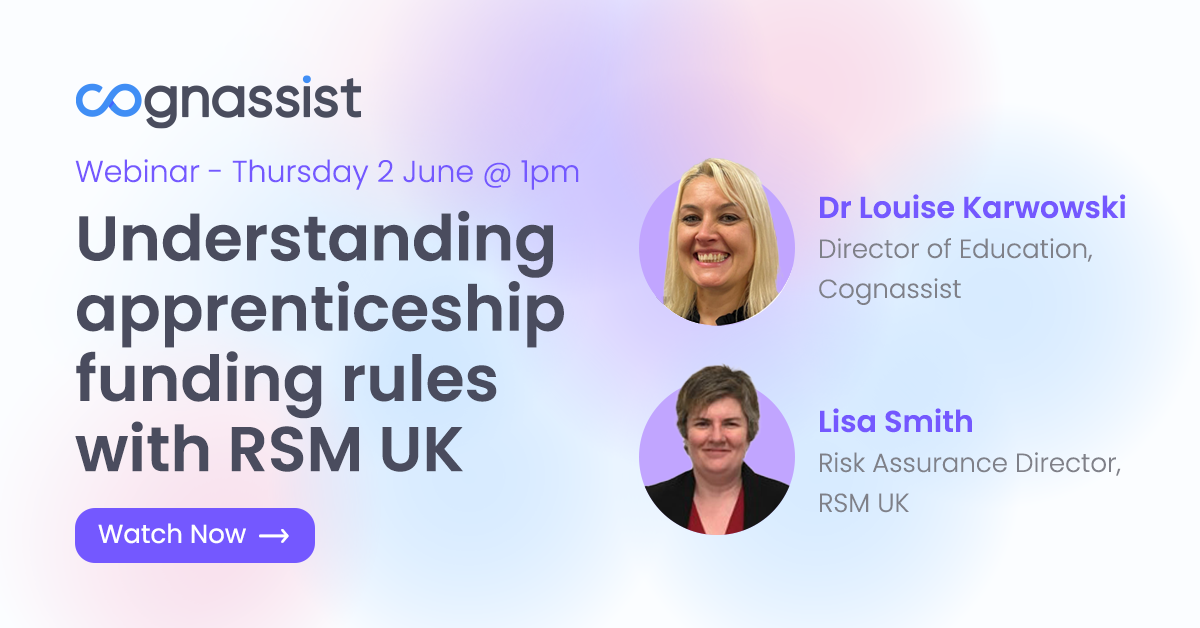
RSM UK auditor explains the Apprenticeship Funding Rules
Cognassist ran a wildly successful webinar with RSM UK’s Risk Assurance Director, Lisa Smith.
If you don’t know, RSM UK hold strong working relationships with the Education and Skills Funding Agency (ESFA), undertaking funding audits and advisory work on its behalf.
The risk assurance team at RSM UK have been providing audit and assurance services to the further education and skills sector for more than 20 years.
And we’re here to share some of Lisa’s insights from the event and gear up for our next funding webinar due to the demand and questions that flooded in.
Funding may not strike everyone as most exciting topic, but it’s certainly proving to be popular!
Really, it’s no surprise.
Apprenticeship providers are under a huge amount of strain financially, with a post-pandemic landscape, a cost of living crisis and industrial action having a co-occurring impact.
Funding becomes ever more important in times like these, and funding for learning support is becoming even more critical.
Ahead of the Government SEND reforms, providers need to be doing everything to ensure that learners with learning difficulties and disabilities receive quality education and an equal opportunity for success.
Often, it feels crass to talk about funding and learner support because learners should be supported no matter what.
But the thing is…
They are.
Learner support is often put in place without providers claiming funding, and this is problem.
Why?
Well, let’s start the conversation around funding and how it helps to provide robust support for learners with different learning needs.
What is learning support funding used for and why should providers claim it?
As we said, providers are implementing support but not claiming, largely because of a lack of confidence in the evidencing required and clawback fears.
Stewart Segal, former AELP CEO and current Chair of Youth Employment UK, previously spoke to Cognassist about this issue:
“I’ve found over the years, not only are they providing the support they didn’t even realise it, but even where they realise that they’re providing additional support, they won’t claim. And I think it’s crazy.
“I think we need to switch it round a bit and focus much more on what the individual apprentice needs.
“There’s a duty really to make sure you understand what they need, particularly if there’s additional needs and special needs, and provide that support.
“So, I don’t think it’s really a choice.
“I would like to think everybody’s providing support and only a certain amount of claiming the right amount. And even where people are claiming, they’re perhaps claiming from the wrong perspective and therefore not claiming enough, and it seems crazy.
“We all think that the programmes are not funded to the extent they should be funded, and yet training providers have it within their gift to claim those funds and they’re not doing so.”
Not claiming funding will have an impact on your learners, not only from a delivery and quality perspective, but from an evidencing and accountability one too.
You are accountable to your learners.
Every education provider must provide reasonable adjustments under the Equality Act 2010 for people who experience learning difficulties and disabilities. It’s about creating robust support that helps to deliver an ambitious curriculum based on each person’s level and support requirements.
Without the appropriate procedures and practices in place, your duty to your learners will remain unmet.
The recent Apprenticeship funding changes
This is where Lisa’s expertise comes in.
The recent changes to the Learning Support Funding (LSF1) rules by the Department for Education have helped to clarify the best practice procedures and practices for evidencing learning support.
The funding rules provide a robust framework and evidencing requirements to ensure your support is properly documented, meaning you can have confidence to claim through the Education and Skills Funding Agency (ESFA).
Lisa spoke about the biggest change to apprenticeship funding:
“Paragraph 29 of the latest release of the funding rules for 2023 to 2024 quite clearly say that as part of that initial assessment – so where you are going through and assessing that learner’s prior knowledge, skills and behaviours that is an eligible cost, remember – you must also undertake a screening to identify whether that individual also needs learning support.
“That is the biggest change in relation to apprenticeships that actually now that initial screening exercise is part of the initial assessment. It is an eligible cost which you can include within the total negotiated price with the employer, so you will actually get funded for that now.
“However, there is a caveat. There is always a caveat. Although the initial assessment is an eligible cost, any further deep dive that you do to identify what that individual support needs might look like and what plans you’re going to be putting in place are not an eligible cost.”
Cognassist is one such screening exercise and our assessment reporting, including reasonable adjustments recommendations, will help you to conduct a further needs assessment to determine the support required.
From a broader evidencing standpoint, Lisa shared what auditors look for:
“From our point of view, as a funding assurance auditor, what we’re looking for are basically three steps.”
#1: Initial assessment and screening of potential learning needs
“The first one is about how have you identified that support need?
“Now that could be through a starting point with a self-declaration from the learner, saying I’ve already had an EHCP previously or another LDA when I was at school – those kinds of things. Again, that’s fine, you can use that as a starting point.
“You can go through and do a cognitive assessment, which, as we’ve just found in relation to apprenticeships, is an expectation now as part of that initial assessment exercise when the learner first looks to enrol on the apprenticeship, and just general discussions with the learner.
“An automated assessment is a great starting point. It’s a great tool for you to start to have those further detailed discussions with the learner because they can tease out some of those hidden issues and concerns. But you can’t rely solely on that as identifying the support needs. Make sure that you carry on reviewing that support need during the learner’s programme.”
#2: Needs assessment and support planning
“Developing and delivering the support plan. Again, you need to make sure that the plan that you are putting in place is tailored to the learner.
“You can’t take a one size fits all approach in this because everybody has their own needs. They all have their own approaches, their own ways of actually dealing with issues and challenges.
“So you do need to make sure that the support plan is unique to that individual, but you also need to be able to demonstrate that the support plan links back to the original assessment of need.”
#3: Monthly reviews
“Make sure that you are reviewing that support plan during the learner’s journey as well as. People who do not present with learning support needs at the start of the programme, then do during the programme. You need to make sure that the support plan that you have put in place remains fit for purpose – Is it still doing its job? Do we need to change it?
“And actually there is a little known rule within the apprenticeship funding rules specifically that say that if you are providing additional learning support to an apprentice, you have to have documented reviews of that additional learning support programme on a monthly basis.
“And the purpose of that is to go, is this still the right support plan? Is it working? Is it having the impact that we need, that we want, that we were expecting? Do we need to change it? Does this person still need this support plan? And again, make sure that you are communicating regularly with your MIS team.”
A thorough two-step assessment is required and there needs to be clear evidence of the supportive journey throughout the learner’s programme as well, which is something that Cognassist client Skern Training and Skills was able to show in their recent positive audit.
Learning Support Funding is there to cover the cost of reasonable adjustments, which, as we said earlier, are a legal duty under the Equality Act 2010.
Learning Support Funding is there to support providers in this legal duty and ensure your learners get the right support in the right place at the right time.
We’ll leave you with one final tip from Lisa:
“More importantly, and where we do tend to find the most issues, is the evidence that you have actually delivered support in the period that you’ve claimed it for. That does tend to be where we find the majority of funding errors, if I’m perfectly honest.”
Funding can only be claimed in the months when support is delivered, you can’t back date this.
If you want the chance to hear more expert advice from Lisa and ask your questions directly to a funding audit expert, please register for our free event below.
You may find you and your learners can’t afford to miss out…
Join Dr Louise Karwowski, Director of Education at Cognassist, and Lisa Smith, Risk Assurance Director at RSM UK, for part 2, as they discuss:
- A deep dive into the updated funding rules, and what a screening activity is for learning support
- Importance of thorough assessment to identify LDD
- Best practice for evidencing with the updated rules
- Your questions

